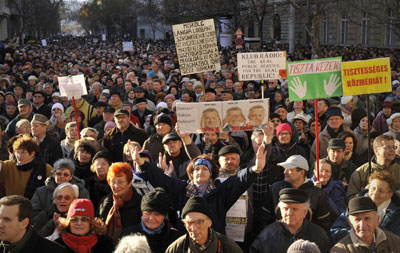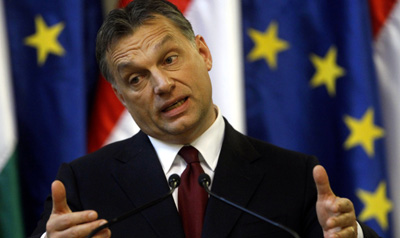Attacks on the Press in 2011: Hungary
On January 1, 2011, the day Hungary assumed the rotating presidency of the European Union, a restrictive new media law came into force. The law created a National Media and Infocommunications Authority–staffed with appointees of the ruling Fidesz party–that was given vast powers to regulate news media. The law established heavy fines for violations such…

Criticism of Hungary’s media controls keeps growing
“Klubrádió solely wants to provide news and present different opinions and never meant to play any emblematic role. But, because of the decision of the Media Authority, it has became the symbol of free speech in Hungary,” stated the broadcaster’s CEO, András Arató, on Sunday when addressing thousands of demonstrators who gathered in central Budapest…

Fundamental changes still needed in Hungary media law
New York, March 11, 2011–The Committee to Protect Journalists calls on Hungarian and European Union authorities to continue to modify a restrictive media law that parliament amended on Monday to comply with demands made by the European Commission–the institution mandated with monitoring the implementation of EU directives. Experts scrutinizing the law’s modifications say the changes…

Hearing: Hungary undermines EU with new media law
When you see the top echelon of the EU press corps–The Guardian, Die Sueddeutsche Zeitung, Le Soir, and others–gathering in front of a meeting room at the European Parliament in Brussels you know that you should follow them inside. These seasoned correspondents select their assignments with a keen sense of urgency, and when they skip…
Hungary must repeal repressive new media law
Dear Prime Minister Orban: The Committee to Protect Journalists calls on you to work toward the immediate repeal of Hungary’s new, severely restrictive media law. “On Media Services and Mass Media,” better known as the Media Act, was approved by the Hungarian parliament on December 21 and signed by President Pal Schmitt on December 30, despite domestic and international alarm at the potentially devastating effect on press freedom. The measure came into force on January 1, the same day Hungary assumed the rotating European Union presidency, sending the very damaging message that Hungary is seeking to nullify citizens’ internationally recognized rights to free expression and access to information.

Family’s ‘truth teller’ speaks: Kati Marton at CPJ
Author and CPJ board member Kati Marton’s parents worked as foreign correspondents in Budapest during the Cold War in the 1950s, exposing Marton to the grit of living in a Communist state. She described feelings of alienation and displacement she felt as a child to an audience at CPJ’s New York offices today. “We lived…

Investigative journalist severely beaten in Hungarian capital
New York, June 25, 2007—The Committee to Protect Journalists condemns Friday’s brutal attack on Iren Karman, an investigative journalist who had published a book and made a documentary film on illegal oil sales in 1990s Hungary. Unknown assailants assaulted Karman in the outskirts of the capital, Budapest, on Friday evening, pushed her into a car,…
Attacks on the Press 2004: Europe and Central Asia Analysis
Overview by Alex Lupis Authoriatarian rulers strengthened their hold on power in many former Soviet republics in 2004. Their secretive, centralized governments aggressively suppressed all forms of independent activity, from journalism and human rights monitoring to religious activism and political opposition.